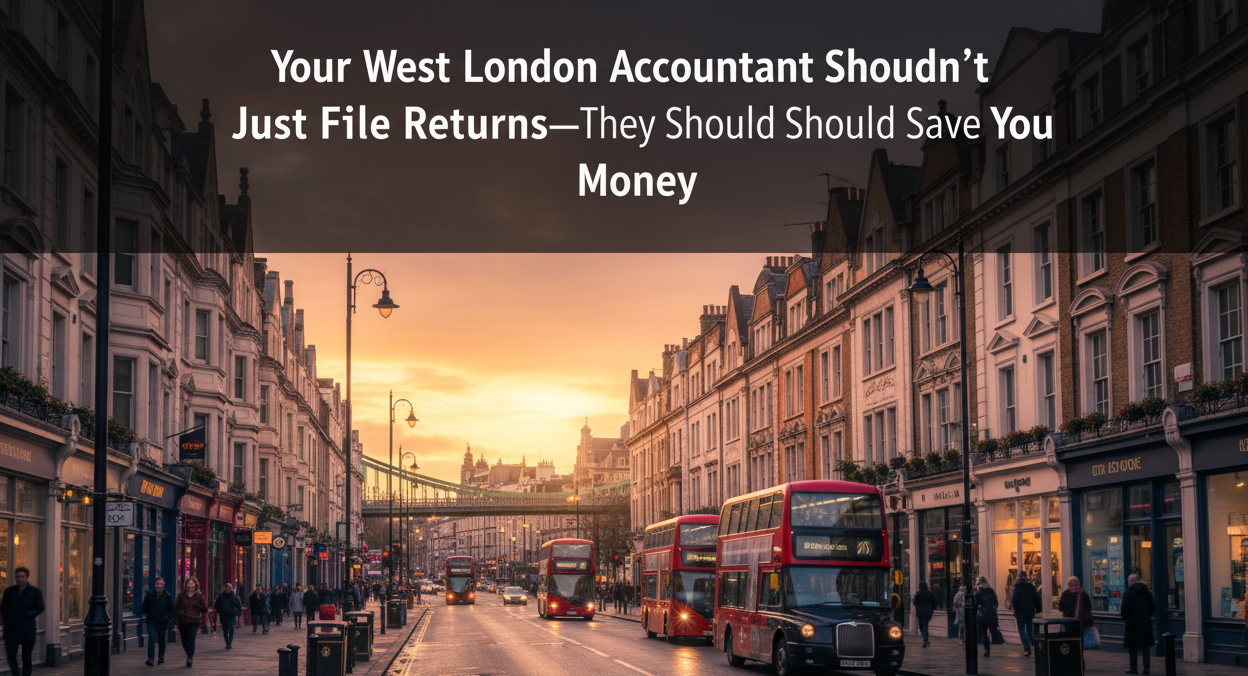
Here’s something nobody tells you when you start a business in West London: the accountant you choose isn’t just filing returns or tallying receipts. They’re either the safety net that catches you before you fall through regulatory cracks, or they’re… well, someone who sends you a bill once a year and disappears.
I’ve watched businesses crumble in Hammersmith, Shepherd’s Bush, and Ealing—not because their ideas were rubbish, but because they treated accounting like an afterthought. Like it’s just maths. It’s not just maths. It’s the difference between keeping 65% of what you earn versus 45%. Between sleeping soundly during tax season versus waking up at 3 AM in cold sweats.
Finding a proper west london accountant isn’t about proximity (though that helps). It’s about finding someone who understands the bizarre dance between HMRC regulations, your business ambitions, and the reality of cash flow when your biggest client pays 60 days late. Again.
The Real Cost of Cheap Accounting (Or: Why My Mate’s Business Nearly Collapsed)
My friend Tom ran a digital agency in Chiswick. Brilliant at branding, utterly hopeless with numbers. He hired the cheapest accountant he could find—£50 a month, purely online, never met the bloke.
Eighteen months later? A £12,000 tax bill he hadn’t budgeted for, penalties for late VAT submissions he didn’t know were due, and a complete mess of expense records that couldn’t be untangled. The “savings” from that cheap accountant cost him nearly three times what a decent west london accountant would have charged. Plus stress that probably shaved years off his life.
The lesson isn’t “spend more on accounting.” It’s “understand what you’re actually buying.”

What Separates Mediocre from Genuinely Useful Accounting Services
Anyone can file a tax return. Seriously—there’s software for that. What you’re really paying for is strategic thinking and someone who picks up the phone when you’re panicking about whether that business lunch is tax-deductible or whether you’ve accidentally committed fraud. (You probably haven’t. But the panic is real.)
Proactive versus reactive—that’s the distinction that matters. A reactive accountant tells you what you owe after it’s too late to do anything about it. Someone proactive? They’re ringing you in November saying, “Listen, if you make that equipment purchase before year-end, here’s how it affects your tax position.”
The Services That Actually Move the Needle
Let’s be specific. When you’re searching for a west london accountant, these are the capabilities that separate the valuable from the mediocre:
- Payroll that doesn’t make you want to scream – Real-time payroll processing, auto-enrolment pension schemes handled properly, and someone who understands the nightmare that is CIS if you’re in construction.
- Tax planning, not just tax filing – There’s a universe of difference. Filing is administrative. Planning means they’re looking at your entire financial picture and finding legitimate ways to reduce what you pay.
- Bookkeeping that connects to strategy – Monthly bookkeeping shouldn’t just be historical record-keeping. It should tell you where money’s leaking, which clients are profitable, and whether that marketing spend is working.
- Business advisory that goes beyond numbers – Growth planning, profitability analysis, helping you decide whether hiring that new person makes financial sense. This is where accounting becomes business partnership.
Something I wish someone had told me earlier: The best accounting relationships feel a bit like therapy. You should be comfortable sharing everything—the good months, the terrible ones, the embarrassing expense you’re not sure about. If you’re hiding things from your accountant out of shame or fear, you’ve got the wrong accountant.
The West London Advantage (Yes, Geography Actually Matters)
You might think location is irrelevant in 2025. Everything’s cloud-based, right? Partially true. But there’s something valuable about working with a west london accountant who understands the local business ecosystem.
They know the commercial property landscape in Hammersmith. They’ve handled tax implications for clients selling businesses in Richmond. They understand the specific challenges of retail operations on Chiswick High Road versus e-commerce businesses run from home offices in Ealing.
More practically: when you need to meet face-to-face (and sometimes you do, especially during crisis moments), you’re not scheduling a trek across London. You can pop into their office during lunch. That accessibility breeds better communication.
| Accounting Service Type | What You Get | Who Actually Needs This | Typical Cost Range |
| Basic Tax Return | Annual self-assessment filing, minimal interaction | Simple sole traders with straightforward income | £150-£300/year |
| Full Bookkeeping Service | Monthly reconciliation, expense tracking, VAT returns | Small businesses with regular transactions | £150-£400/month |
| Payroll Management | Salary processing, PAYE, pension auto-enrolment | Any business with employees (legally required) | £15-£30 per employee/month |
| Strategic Tax Planning | Year-round tax optimisation, structure advice | Growing businesses or high earners | £2,000-£5,000+/year |
| Full Business Advisory | Growth planning, profitability analysis, forecasting | Businesses serious about scaling | £500-£2,000/month |

Inheritance Tax Planning (The Thing Nobody Wants to Think About Until It’s Too Late)
Right. Deep breath. Let’s talk about the thing most people actively avoid until they absolutely cannot anymore: inheritance tax.
If you’re sitting on property wealth in West London (and let’s be honest, if you own property here, you probably are), this matters more than you think. The current inheritance tax threshold is £325,000 per person. A semi-detached house in Chiswick blows past that without breaking a sweat.
Your kids or heirs could face a 40% tax bill on everything above the threshold. On a £1 million estate (not uncommon in West London), that’s potentially £270,000 going to HMRC instead of your family.
But here’s where a knowledgeable west london accountant becomes genuinely valuable: there are legitimate, legal strategies to reduce this burden. Trusts, gift planning, business property relief if you own a company. It’s complex stuff. Get it wrong, and you’ve wasted time and money. Get it right, and you’ve protected hundreds of thousands of pounds.
Critical warning: Inheritance tax planning needs to happen years in advance, not months. Some strategies require you to survive for seven years after implementation. This is not last-minute territory. If you’re over 50 and own significant assets, you should be having this conversation now.
When Payroll Becomes a Headache (And How to Make It Stop)
Payroll. God, payroll. If you’ve never handled it yourself, you might think it’s just “pay people their salary.” If you have handled it, you know it’s a monthly exercise in not making costly mistakes.
PAYE calculations, National Insurance contributions, student loan deductions, pension auto-enrolment, P11Ds for benefits, submitting Real Time Information to HMRC, handling statutory sick pay, maternity pay, tax code changes mid-year…
One error can trigger HMRC penalties. Mess up auto-enrolment, and The Pensions Regulator gets involved (they’re not friendly). Miss a submission deadline? More penalties.
For businesses in construction, there’s the added joy of the CIS (Construction Industry Scheme). If you’re hiring subcontractors, you need to register, make deductions, file monthly returns. Get it wrong, and subcontractors blame you for their missing payments. Get it really wrong, and HMRC comes after you for the money.
This is where outsourcing to a proper west london accountant who handles payroll daily makes sense. They’ve got the software, the knowledge, and they’re doing this for dozens of clients. You get accuracy and compliance without the headache.
What Good Payroll Service Actually Looks Like
- They process everything on time, every time (ideally 3-4 days before payday so there’s buffer room for issues)
- They handle all HMRC submissions automatically—you shouldn’t even think about it
- They deal with pension scheme administration and auto-enrolment requirements
- They provide payslips to your staff directly (removes you as the middleman)
- They’re available when employees have questions about their pay or tax codes
The monthly cost is usually somewhere between £15-£30 per employee. For that, you get peace of mind and time back. Time you can spend actually running your business instead of wrestling with HMRC’s Real Time Information system at 11 PM.
CIS Claims and Refunds: Construction’s Hidden Cash Recovery
If you work in construction—and plenty of West London businesses do, given the constant development here—you’ve probably had tax deducted under the CIS. What many people don’t realise is they might be due refunds. Substantial ones.
The Construction Industry Scheme requires contractors to deduct tax from subcontractors’ payments. But if your actual tax liability for the year is lower than what was deducted (because you had legitimate expenses, losses, or allowances), you can claim that money back.
I’ve seen people leave thousands of pounds sitting with HMRC because they didn’t know they could claim it back, or couldn’t face the paperwork. A specialist west london accountant familiar with CIS can identify what you’re owed and handle the entire claims process. They typically work on a percentage of what they recover, so there’s no upfront cost.

The Bookkeeping Question: DIY or Delegate?
There’s a weird middle ground lots of small business owners get stuck in. They’re doing their own bookkeeping because they think they should, or because they’re trying to save money. But they hate it. And they’re not very good at it. And it takes them five hours a month they could spend earning money or improving their business.
So here’s the maths: if professional bookkeeping costs £200/month, but you’re spending six hours monthly on it yourself, and your time is worth more than £33/hour… you’re losing money by DIYing.
Beyond the numbers, there’s the accuracy factor. Professional bookkeeping means your accounts are actually useful. You get meaningful financial reports that tell you things. Cash flow forecasts that help you plan. Expense categorisation that maximises your tax deductions.
Amateur bookkeeping often means shoving receipts into folders and hoping for the best. Then spending January in a panic trying to reconstruct an entire year of transactions.
Red Flags Your Bookkeeping Needs Professional Help
- You’re regularly late on VAT returns (or you missed one entirely)
- You can’t tell me your profit margin on five minutes’ notice
- Reconciling your bank accounts is something you do “eventually”
- You’re not entirely sure what you can legitimately claim as expenses
- The thought of an HMRC audit makes you want to fake your own death
If even two of these apply, it’s time to hand this off to a west london accountant who does accounting and bookkeeping professionally.
| Common Bookkeeping Mistake | Why It Happens | The Actual Consequence |
| Mixing personal & business expenses | Using same account for everything | Disallowed deductions, potential HMRC investigation |
| Not tracking mileage properly | Forgetting to log journeys | Missing £1,000s in legitimate deductions (45p per mile adds up) |
| Incorrect VAT categorisation | Not understanding different VAT rates | Over or underpaying VAT, plus penalties if caught |
| No backup for expenses | Lost receipts or digital records | Can’t prove expenses to HMRC = no deduction allowed |
| Forgetting about accruals | Recording income/expenses in wrong period | Inaccurate financial picture, bad business decisions |
Business Growth Planning: Where Numbers Meet Strategy
This is where accounting transforms from necessary evil into genuine business asset. Most people think accountants just record what happened. The good ones help you figure out what should happen next.
Business growth planning means looking at your financials and asking uncomfortable questions: Which products or services are actually profitable? (Often not the ones you think.) Where’s cash getting stuck? Should you hire that new person, or will it break your cash flow? Is it time to raise prices? By how much?
A west london accountant offering business advisory services should be doing scenario planning with you. “If you expand to a second location, here’s what your break-even looks like.” “If you increase marketing spend by 30%, you need this much extra revenue to justify it.” “Here’s how switching from sole trader to limited company affects your tax position.”
This is strategic thinking backed by actual numbers instead of hopeful guessing.
Questions Your Accountant Should Be Asking You
If your accountant never asks you these questions, they’re not doing business advisory—they’re doing compliance paperwork:
- What are your revenue targets for next year, and are they realistic based on current trajectory?
- Which clients or products deliver the best margins?
- Where are you losing money without realising it?
- What’s your cash runway if sales slow down?
- Are you structuring your business in the most tax-efficient way?
- What’s stopping you from scaling right now—is it actually a money problem, or something else?
These conversations matter more than perfect bookkeeping. Perfect bookkeeping just tells you what happened. Strategic advisory helps you control what happens next.
Finding Your West London Accountant: The Practical Bit
So you’re convinced you need proper accounting help. How do you actually find someone who’s not rubbish?
Credentials matter, but aren’t everything. Look for someone who’s ACCA, ACA, or CIMA qualified. But qualifications don’t guarantee they’re good at client service or strategic thinking. Some of the best accountants I know are personable, proactive communicators. Some of the most technically qualified ones are impossible to get hold of and speak in incomprehensible jargon.
Industry experience helps enormously. If you run a restaurant, an accountant who’s worked with hospitality businesses understands your specific challenges. E-commerce, construction, professional services, retail—each has unique considerations.
Communication style is underrated. You should actually understand what your accountant is telling you. If they can’t explain complex tax concepts in plain English, they’re not as useful as they think they are.
Local presence still has value. Yes, you can work with accountants entirely remotely. But there’s something reassuring about knowing you could walk into an office if needed. About working with someone who understands West London’s business landscape because they’re part of it.
Interview question that separates good from mediocre: Ask potential accountants this: “Tell me about a time you saved a client money through proactive tax planning.” If they can’t give you a specific example with actual numbers, they’re not doing tax advisory—they’re just filing returns. Walk away.
The Services That Make a Difference: A Reality Check
Let’s talk about what you actually need versus what gets sold. The accounting industry loves packaging services into expensive bundles you might not need.
Tax advisory solutions should be proactive conversations throughout the year, not a single meeting in March. If you’re only hearing from your accountant at tax deadline time, you’re not getting tax advisory—you’re getting tax filing.
Business accounting services is a vague term that should mean comprehensive support: bookkeeping, financial reporting, advice, and someone who actually knows your business. If it just means “we file your annual accounts,” that’s not full-service.
Small business accounting services specifically should recognise that small businesses need efficiency and value. You can’t afford to pay for services you don’t need, but you also can’t afford to miss critical compliance or make avoidable mistakes.
For small to medium businesses in areas like Fulham, Richmond, or Putney, working with a local west london accountant who understands the regional business environment makes practical sense. They understand local commercial property values (relevant for premises expenses and business rates). They’ve likely worked with your competitors or complementary businesses. They know local HMRC offices and how they tend to operate.
When to Actually Ring Your Accountant (Besides Tax Season)
Most people only contact their accountant when legally required. That’s a waste of the relationship. Here’s when you should actually be reaching out:
- Before making major purchases – “I’m thinking of buying this equipment, what’s the tax treatment?”
- When considering business structure changes – Moving from sole trader to limited company, taking on partners, etc.
- If you’re planning to hire – Employment versus contractor status has huge implications
- Before year-end – There might be legitimate moves to make before the tax year closes
- When cash flow feels wrong – Even if you can’t articulate why, that instinct matters
- After any significant life changes – Marriage, divorce, inheritance, moving house
Ask Accountant: A Local Example Worth Considering
Since we’re discussing what good accounting actually looks like in West London, it’s worth mentioning Ask Accountant as a practical example. Based at 178 Merton High St, London SW19 1AY, they demonstrate the comprehensive approach we’ve been talking about throughout this piece.
Their service range covers what small businesses actually need: inheritance tax planning for property owners, business advice that goes beyond number-crunching, CIS claims and refunds for construction trades, proactive tax advisory solutions rather than reactive filing, business accounting services, bookkeeping, auto-enrolment, small business accounting services, and business growth planning. That’s the full spectrum—not just compliance, but genuine strategic support.
What makes them relevant to this discussion isn’t just the services list (plenty of firms claim similar offerings). It’s the local presence combined with accessibility. When you need advice, you can ring +44(0)20 8543 1991 and actually speak to someone who knows your business. When face-to-face meetings matter, you’re not dealing with a faceless online portal. You can contact them.
Obviously, they are not the only ones, in West London. However, they are what you are to seek: a full service, local expertise, and the type of a proactive business stance that prevents issues as opposed to merely addressing them once they manifest themselves.
The Bottom Line (Pun Intended)
That is all this whole article is, your accountant is supposed to ease, not to complicate, your life. They ought to save you than to cost. They must be able to give it out simply. And without feeling weird you ought to ask them questions.
Unless your current accounting situation is satisfying those requirements, some change is required. Whether that involves a blunt talk with your current accountant with regard to expectations, or seeking a new west london accountant who fits better than the current one.
The competitive environment of the West London business is not excessive to put any unnecessary financial burden or compliance risks. You should have your accounting as your foundation and all other parts of your business should be the furniture rather than the unsteady part of the building that you fear will fall down.
Get it right, then you can start doing what you are really good at, which is running your business. Misstep it and you will have spent half of your life putting off issues that could have been prevented and half a day will have to be spent reprimanding about how you began.
Choose wisely. You will be happy later on (your bank account will thank you).
Frequently Asked Questions
What do I think I will pay a west london accountant?
This is absolutely different depending on what you require. Simple tax returns of sole traders may cost between £150 and 300 a year. The monthly bookkeeping will cost around £150-400. The price of full accounting of small limited companies is normally between £1,500 and £5000 annually. Never just buy based on the cost- the lowest cost may be more expensive in the long term in terms of lost tax breaks or even fines.
What is the difference between a book keeper and an accountant?
Day to day record keeping, bank reconciliation and simple financial organisation is undertaken by bookkeepers. Accountants give strategic advice, tax planning, financial analysis, as well as prepare official accounts. The two services are provided by a number of accounting firms. In the case of small business, you may require both, bookkeeping so that you are sure the records are correct, and accounting to plan and comply.
Do I have to hire a local accountant or can I hire a remote one?
Modern cloud accounting software can be used to work remotely with ease. Nevertheless, local accountants are familiar with local business environment, property price, and other issues that may be unique to West London. In situations where it is required, face-to-face meetings are also simpler. It’s about preference—some people value the local relationship, others prioritise finding the perfect fit regardless of location.
When should a sole trader consider switching to a limited company?
Generally when your profits consistently exceed £50,000-£60,000 annually. At that point, the tax savings from running a limited company typically outweigh the increased admin and costs. However, everyone’s situation differs based on pension contributions, personal allowances, and business plans. This is exactly the kind of question your accountant should help you analyse.
Can my accountant help with business advice beyond just tax?
The good ones, yes. Look for accountants offering “business advisory” or “business growth planning” services. They should help with pricing strategies, profitability analysis, expansion planning, and financial forecasting. If your accountant only contacts you at tax deadline time, they’re not doing business advisory—you might need to find someone who does.
What records do I need to keep for HMRC?
Keep all business records for at least six years (five years after the January 31st submission deadline). This includes invoices, receipts, bank statements, VAT records, payroll records, and proof of business expenses. Digital records are acceptable. Many businesses now use cloud accounting software that stores everything automatically. Missing records during an HMRC inspection means disallowed deductions—expensive mistake.








open binance account
January 3, 2026Thank you for your sharing. I am worried that I lack creative ideas. It is your article that makes me full of hope. Thank you. But, I have a question, can you help me?